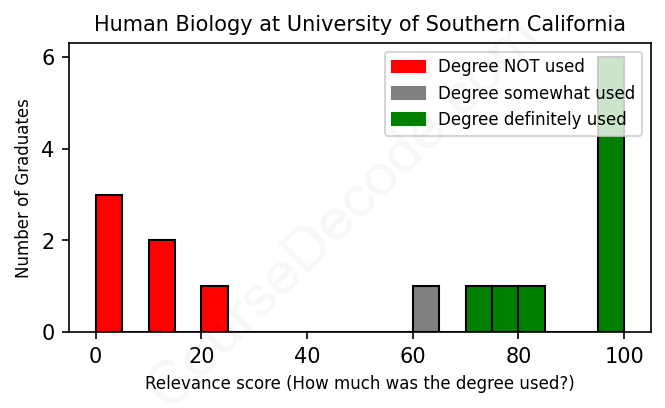
First, some facts. Of the Human Biology graduates from University of Southern California we've analyzed , here's how many have used (or NOT used) their degree in their career:

These are estimates based on AI analysis of 16 LinkedIn profiles (see below).
The verdict? Below average. Overall, with an average relevance score of 58%, Human Biology graduates from University of Southern California have a lower likelihood (-9%) of finding work in this field compared to the average graduate across all fields:
And for comparison, here's the chart for all profiles we've looked at across all degrees.
Also, after graduating, 50% of these graduates have pursued further education other than another Bachelor's degree (such as a Masters degree or other), compared to the average across all profiles of 35%. This suggests you may need more than just a Bachelors degree to be competitive as a Human Biology graduate.
See the details:
|
Relevance score: 71% We think this person has gone into a career highly relevant to their degree. We think this person has gone into a career highly relevant to their degree.
DEGREE INFOGraduated in 2022 from University of Southern California with a Bachelor's degree in Human Biology. Also pursued further education since (see below). JOB HISTORY SINCE GRADUATIONIntern PUENTE Learning Center Oct 2022 - Present Research Intern  LAC-USC MED CENTER Mar 2023 - Present FURTHER DEGREES DONE SINCE GRADUATINGUnknown degreeKeck School of Medicine of the University of Southern California 2022 - 2026 ABOUTNo information provided. |
The top 10 most common jobs done by the graduates we've analyzed (ranked most common to least) are:
People who graduated with a degree in Human Biology from the University of Southern California have ventured into a wide variety of jobs, but certain patterns emerge when you look at the most common roles. Many have gravitated toward positions in healthcare and clinical settings, such as Medical Scribes, Clinical Research Coordinators, and Physical Therapy Technicians. These roles leverage their knowledge of human biology, allowing them to apply what they learned in school to real-world health scenarios. For instance, working as a Medical Scribe or Clinical Research Coordinator means they often encounter medical terminology and biological principles daily, directly linking their education to their job responsibilities.
However, not all job choices relate closely to Human Biology. A significant number of alumni have taken paths that veer into finance, customer service, or sales, like being a Financial Advisor or working in real estate. These positions largely focus on financial skills, client interactions, and organizational tasks rather than biological concepts. In short, while many graduates find roles that are deeply connected to human biology and healthcare, others end up in seemingly unrelated fields, indicating a mixed relevance of their degree to their current jobs. So, if you're thinking about a degree in Human Biology, be prepared for a range of possibilities, some of which might take you far from the science lab!
Here is a visual representation of the most common words in job titles for Human Biology graduates (this is across all Human Biology graduates we've analyzed, not just those who went to University of Southern California):

It looks like graduates from the Human Biology program at USC have generally pursued a wide range of career paths, with a good chunk of them landing roles that are quite relevant to their major. For many, their first job after graduation leans towards healthcare support positions, like medical scribes or clinical research coordinators. This makes sense because these roles help them gain valuable experience in the medical field, setting the stage for future studies or advanced positions. You can see that many grads have moved into roles at hospitals or research facilities early on, which really plays to their background in Human Biology.
As time goes on, especially around the 5 to 10-year mark, we see a mix of outcomes. Some have successfully transitioned into clinical roles, like residents in medical programs or dental specialties, while others seem to have taken more of a detour, ending up in fields like financial services or fitness management. A few grads even explore administrative roles within healthcare which might not be directly linked to the scientific aspects of their degree but still show a solid understanding of the healthcare landscape. On the whole, there are definitely success stories where grads are thriving in health-related careers, but there are also examples of folks who might be working in roles that don’t capitalize on their Human Biology education as much. So, it really varies from person to person!
Hey there! So, getting a Bachelor’s degree in Human Biology, especially at a school like USC, can be a challenge, but it’s not necessarily the hardest out there. You’ll dive into some complex topics like anatomy, physiology, genetics, and maybe even some biochemistry, which can get pretty intense. The workload is decent—lots of labs and group projects, plus some heavy hitting exams—but if you have a genuine interest in the subject, it can actually be pretty engaging. It’s definitely more rigorous than a lot of general studies programs, but if you're organized and stay on top of your studies, you can definitely handle it! Just make sure you're ready for a mix of hard science and critical thinking.
Most commonly, in the LinkedIn profiles we've looked at, it takes people 4 years to finish a Bachelor degree in Human Biology.
So, looking at the job histories of these USC Human Biology grads, it seems like they're on pretty different paths when it comes to making money. Some, like those who went into finance or are in medical school, probably have decent earning potential ahead of them, especially as they move into roles like financial advising or medicine, where salaries can be pretty good once they get established. On the flip side, positions like medical scribes or physical therapy aides don’t usually pay that well, especially starting out. A few are even just getting started on their career journeys in internships or entry-level roles, which are often low-paying. Overall, while some of them could end up doing well financially in the long run, others might need to hustle a bit harder to hit those higher income brackets.
Here is a visual representation of the most common words seen in the "about" section of LinkedIn profiles who have a Bachelor degree in Human Biology (this is across all Human Biology graduates we've analyzed, not just those who went to University of Southern California). This may or may not be useful:

Here are all colleges offering a Bachelor degree in Human Biology (ordered by the average relevance score of their Human Biology graduates, best to worst) where we have analyzed at least 10 of their graduates:
| College | Score | Count |
|---|---|---|
 Indiana University Bloomington Indiana University Bloomington
|
95 | 10 |
 University of California San Diego University of California San Diego
|
89 | 20 |
 UC San Diego UC San Diego
|
89 | 18 |
 University of California, San Diego University of California, San Diego
|
86 | 16 |
 Stanford University Stanford University
|
84 | 10 |
 University of California, Merced University of California, Merced
|
84 | 16 |
 University of Wisconsin-Green Bay University of Wisconsin-Green Bay
|
79 | 10 |
 North Carolina State University North Carolina State University
|
75 | 31 |
 Michigan State University Michigan State University
|
71 | 48 |
 The University of Texas at Austin The University of Texas at Austin
|
69 | 17 |
 University at Albany, SUNY University at Albany, SUNY
|
69 | 15 |
 Hunter College Hunter College
|
60 | 14 |
 University of Southern California University of Southern California
|
58 | 16 |